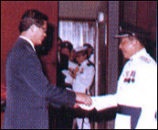About Private Investigations
How to Manage Private Investigation Business in Singapore
This guideline is written by Mr. Magnum Jegan, who is the pioneer and a leader of private investigation industry, since 1984, managing investigation business in line with the guidelines set up by Singapore Police Force (SPF) and Workforce Development Agency (WDA Singapore)
Mr. SM Jegan is a founder of Kokusai Pte Ltd, a company whose professionalism and dedication have earned wide media coverage on CNN and BBC as a well organised and established agency in the world.
Private Investigation is client-oriented, unlike Police investigation. Therefore, private investigators need to know the key elements of your case before undertaking any assignment. Collection of all information are based on communication and observation.
We need to know WHO is the target, WHEN and WHERE the investigation should take place, WHY you want to investigate, WHAT to be done and HOW to do it.
Police investigation and private investigation share the same principles but differ in applications. Private investigation in Singapore is regulated by law, and to operate within the legal framework.
Some of the basic guidelines to follow:
1. Understand and perform Private Investigation work professionally and able to interpret job roles and their responsibilities.
2. Physically and mentally fit.
3. Private Investigators in Singapore their management should be able to perform investigation business professionally with integrity, loyalty, honesty and reliability.
4. Private Investigators in Singapore should respect all persons.
5. Private Investigators must ensure working relationship with their clients with highest moral and ethical standard.
6. Private Investigators Singapore must safeguard confidentiality of given assignment and clients information.
7. Knowledge in formal and informal recruitment and develop interview skills.
8. Private Investigators must be patient, honest, reliable and with integrity.
9. Identify what their clients want to do for the case
10. Study the job details
11. Determine the method of Investigation
12. Gather and review available background information/data.
13. Analyse information and provide initial advice and consider option for the method of investigation.
14. Prepare logistic supplies that are relevant to the investigation activities.
15. Create an Investigation Log Sheet and able to write reports with date, time, place with listing the diary of events together with detail writing all information observed, heard and supporting documents.
16. Ensure newly employed Private Investigators receive effective coaching from Senior Private Investigators after learning in classes from accredited training institutes and able to work irregular hours. Able to read and write simple English. Footmen with vehicle licence are preferable.
17. Private Investigators must be observant, able to think of the on the feet (Street-smart)
18. Interpret job roles and their responsibilities.
19. Know their duties and responsibilities as a Private Investigator.
20. Know the Private Investigator code of ethics.
21. Comply and observe legislative requirement and regulations governing the Private Investigation industry and conduct investigation assignment in line with legislative requirements.
- 21.1 Private Investigation and Security Agencies (PSI) Act 2009
- 21.2 Criminal Procedure Code
- 21.3 Penal Code
- 21.4 Evidence Act
- 21.5 Trade Marks Act
- 21.6 Legal boundaries of Private Investigator - e.g. Penal Code relevant sections on trespassing, insulting the modesty of a woman, forgery and fabricating false evidence.
- 21.7 Official Secrecy Act.
- 21.8 Organizational procedures for conducting investigation assignment in compliance with legal requirements
22. Able to give evidence in court with professionalisms.
What is Surveillance?
Surveillance is monitoring a location or a person to establish the activities of the person or the place. Surveillance can be covert or overt.
How to Prepare for Surveillance operations?
1. Investigation case details and information
- ⇒ Obtain and clarify investigation case details with supervisor/manager in accordance with organizational requirements and confirm purpose and relevant information to be collected.
2. Plan and prioritize investigation case in accordance with criticality and urgency of assignments and formulate contingency plans for the effective deployment of surveillance operations
- ⇒ Plan and prioritize critical work tasks relating to surveillance operations
- ⇒ Establish assignment objectives, time frame and schedules
- ⇒ Surveillance equipments requirements and other resources
- ⇒ Establish reporting frequency and procedures
- ⇒ Applicable legislations
- ⇒ Formulate operational and contingency plan
- ⇒ Deploy of equipment
- ⇒ Deployment of equipment when encounter difficulties or failure
3. Identify operational environment and surveillance equipment required for surveillance operations
- ⇒ Vehicle and transportation
- ⇒ Cameras
- ⇒ Video camera recorder
- ⇒ Mobile Phone
- ⇒ Type of clothing to be worn
- ⇒ Transport required
- ⇒ Transcript recorder
- ⇒ Binoculars
- ⇒ PDA
- ⇒ Audio recorder
4. Conduct pre-operational checks on surveillance equipment for operation readiness and effectiveness in accordance with organizational requirements
- ⇒ Operational environment and special equipment which may include
- ⇒ Nature of surveillance operations
- ⇒ Types of situation and environment involve in operations
- ⇒ Characteristic of target(s)
- ⇒ Specialized equipments such as radio headset, camera, tapping devices, communication devices
- ⇒ Additional manpower
- ⇒ Pre-operational checks on surveillance equipments in accordance with organizational requirements
5. Ascertain licenses for operating surveillance equipment and approval from the relevant authorities, where required, have been obtained in writing
- ⇒ MDA (Media Development Authority)
- ⇒ IDA (Infocomm Development Authority)
6. Establish communication channels with supervisor/manager in accordance with organizational requirements
- ⇒ Organizational networks
- ⇒ Use of concise and precise statements (short and sharp)
7. Identify safety risks relating to investigation and carry out appropriate risk control measures in accordance with organizational requirements
- ⇒ Safety risks relating to investigation which may include:
- ⇒ Speeding vehicle (Road condition)
- ⇒ Personal protection equipment when entering restricted areas (e.g. construction sites – use helmet and boots when entering construction worksites)
- ⇒ Knowledge of criminal syndicates
- ⇒ Look out for counter-surveillance
8. Regulation
- ⇒ Evidence Act
- ⇒ Real evidence
- ⇒ Hearsay evidence
- ⇒ Direct evidence
When Does Private Investigators Investigation Become Illegal?
To become a Private Investigator in Singapore, we need to pass the 7 days training at any accredited training center like NTUC learning HUB.
It’s illegal to be deployed or work without certification.
We don’t need to be ex-Police officers to be qualified to become a Private Investigator. The job scope of Police Officers and Private Investigators are different, even though the principles are the same.

HOW PRIVATE INVESTIGATORS WORK
Private investigations covers a wide range of activities. There are many methods of carrying out an investigation. Conducting observation, trailing, interviews, undercover operation and entrapment are some of the methods to gather information and evidence in private investigation. Private investigation is client-oriented.
Private investigators must understand clients’ objectives, and must provide information covering ‘who’ ‘when’ ‘where’ ‘what’ and ‘how’ to meet clients objectives.

PRIVATE INVESTIGATORS IN SINGAPORE
A Private Investigator (PI) or Private Detective is an investigator who is not a police officer but carries out investigation work for private cases. In some countries including Singapore, license is required to carry out private investigation work.

SURVEILLANCE
Surveillance is monitoring of locations or persons to determine what activities are occurring. Surveillance can be covert or overt. It can be done by IP video cameras or by human eyes. Surveillance skills must be learnt on the filed. It requires street-smartness, resourcefulness, and ability to understand human behaviors.

INVESTIGATIVE INTERVIEW
A Private Investigator (PI) or Private Detective is an investigator who is not a police officer but carries out investigation work for private cases. In some countries including Singapore, license is required to carry out private investigation work.

Singapore is a clean city. Our government and our criminal justice system is likewise clean and transparent. Private Investigators in Singapore similarly must be clean and transparent.






